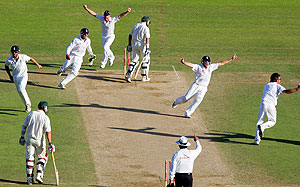
England's Graeme Swann, right, takes the final wicket of Australia's Brad Haddin, 4th right, to dismiss Australia to win the Ashes on the fourth day of the fifth Ashes cricket test match at the Oval cricket ground, London, Sunday Aug. 23, 2009. (AP Photo/Tom Hevezi)
The autopsy of Ricky Ponting’s second successive Ashes loss in England should be brutal. I fear it will not be. The entrails should be laid out, read by the augaries and verdicts announced. Those managing the dissection should include the Chairman and CEO of Cricket Australia.
It will not be enough to leave this in the hands of the selection panel for they are as culpable as the players who took the field.
It is not in hindsight that the touring squad was criticised for the inappropriate balance that delivered neither a second specialist spinner nor opening batsmen among the 16.
Please don’t tell me that Shane Watson was a success at the top – when you get away to as many starts as he did you need to convert a fair number of those into big scores, scores that make team first innings big enough for winning comfort.
Watson’s consistent failure to go on past the half century was maddening, especially as he was out LBW and bowled so often.
The sign of a true opener is one who battles through the new ball and prospers against the old.
But back to the selectors. They deemed a need to reward players for past efforts, even modest ones rather than think of a strategy for the NEXT series, one played in different conditions and with different skills.
The selectors took a gamble of sorts in that Phil Hughes would continue his golden beginnings and then dumped him after three innings one of which was 36 and replaced him with a late order batsmen who averaged four point-zip in his previous first class opening attempts!
Andrew MacDonald was NEVER considered for a Test berth in a series where Australia were struggling, but I reckon Doug Bollinger would have been a chance if they had bothered to pick a specialist fast bowler.
Stuart Clark twiddled his thumbs, chewed nails and carried drinks until his opportunity finally arrived. Australia duly won.
Nathan Hauritz doen’t know whether he is coming or going. Apparently he is not required on turning pitches any more. I wonder under what conditions he will return to the XI?
Mike Hussey may have extended his career after the gutsy and lengthy hundred (219 balls for 100) after being dropped four times. A ton in a big losing margin, hmmm, whether this innings will keep a younger man from the middle order must be thoroughly discussed, and not just by the punters.
Ricky Ponting’s run-out had all the trade marks of his Trent Bridge 2005 dismissal, when he left the field hurling abuse at the England coach for having the audacity to use a substitute fieldsmen.
That run out, as this one at The Oval, had little to do with the quality of the fieldsmen and a lot to do with Ponting ‘ball watching’ and dawdling.
On both occasions he may have been safe with a little more attention to detail. Up to that moment he and Hussey had negotiated the turbulent waters and were sailing as comfortably as the dusty surface would allow.
Mitchell Johnson is capable of producing truly dangerous deliveries, but dangerous overs or spells or consecutive matches are, at this stage, beyond him.
He still picks up wickets because of raw pace and extra bounce plus that slinging action that leaves batsmen with a late look at the ball, but if Australia are to return to being a consistent team they need the spearhead to be on his game most of the time.
Hilfenhaus and Siddle are the workmen and good at their jobs but they are not strike bowlers. They wear batsmen down well enough, but you need a bit more than that at elite level.
They are supposed to be the support wing for Johnson’s bombing raids but recently Johnson has been coming on at first or second change and that is not what number one destroyer is supposed to do.
All these matters require good coaching and thoughtful, wise selecting, but given those failings there is one single influential moment in this series where the Ashes were lost.
Look no further than the First Test. With 69 deliveries left in the match Australia needed one single wicket to complete their domination of a cowering England.
A first up win in such crushing fashion would have set the tone for the remainder, England would not have recovered and Philip Hughes would have been retained with exactly the same amount of runs with which he was dropped.
With two left handers at the crease – Anderson, useful at number 10 and Panesar, a genuine eleven – captain Ponting threw the ball to decent part time offie Marcus North. Nathan Hauritz was operating at the other end.
The fastest bowler on the ground was not called upon, neither were the next two in pace. (Perhaps the captain had over rates on his mind after the events of India last october ?)
Plan ‘A’, should have been to intimidate Panesar, then get him out. This is not rocket science. England survived and turned the momentum of the QEII around.
There was not much between these two teams, that observation was made before the series began and was proven in the most eclectic of Ashes.
Good decision making by leaders therefore became paramount. Andrew Hilditch and Ricky Ponting have ruled as Australia have lost three of the past four series. I hope the forensics are thorough.





























































































